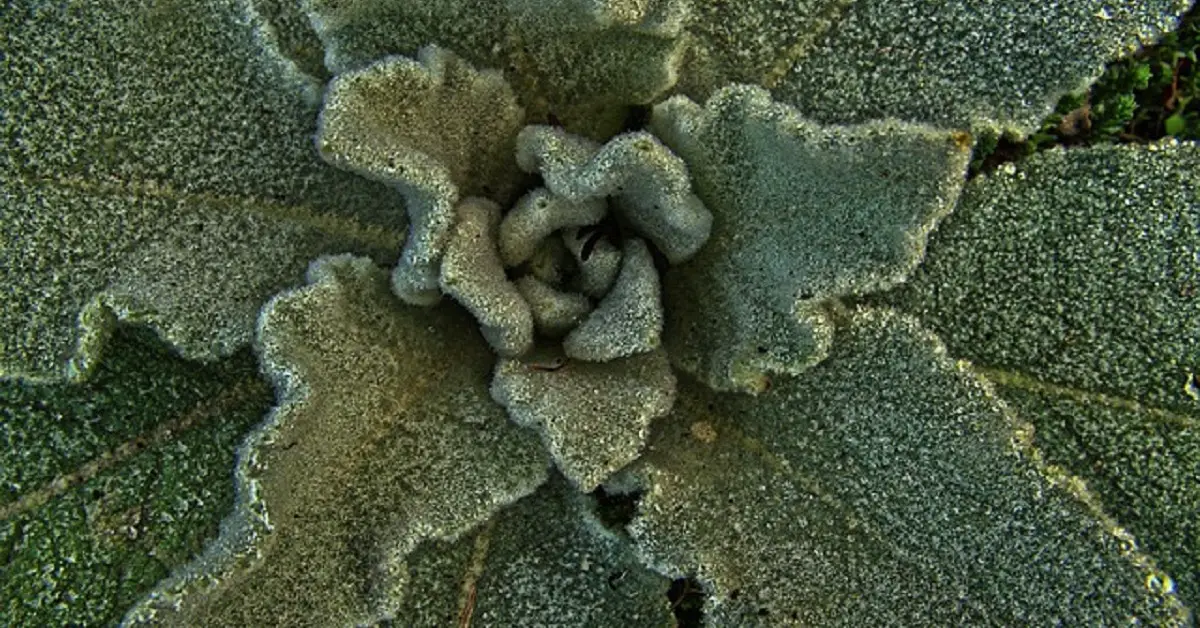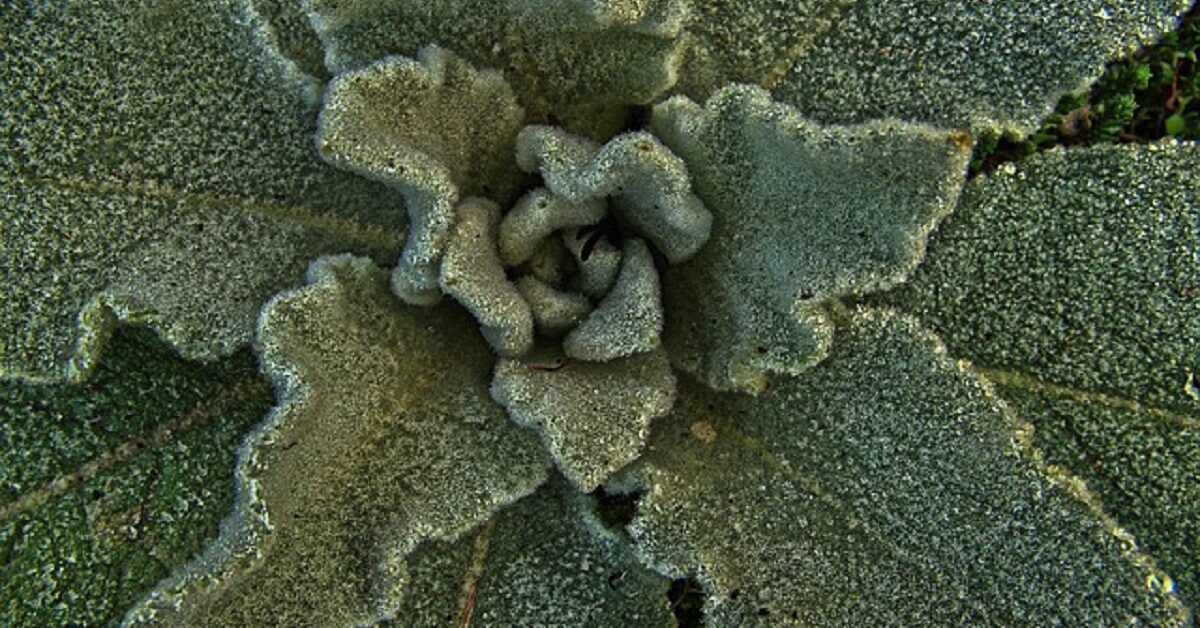
This article explores the health benefits of mullein leaf tea made from the leaves of flowering plants belonging to the genus Verbascum, family Scrophulariaceae (figworts). There are more than 350 species of plants belonging to the genus. They are found in many parts of the world, including Europe, Asia, and northern Africa.
Mullein was recently introduced to North America and Australia. The best-known member of the genus in the U.S. is Verbascum thapsus (common mullein, great mullein, or greater mullein). It is also known informally by various names, including Aaron’s Rod, Adam’s Flannel, hare’s beard, lungwort, beggar’s blanket, and candlewick.
Although sometimes regarded as a weed, the leaves, flowers, and roots have been used for medicinal purposes for centuries. Mullein leaf and flower may be used fresh or dried. They are served as tea, extract, powder, oil, and capsule, while some consider it a herb to smoke.
Mullein leaf tea, extract, and powder are used in folk medicine to treat various conditions, including cough, earache, flu, bronchitis, asthma symptoms, chest infections, constipation, diarrhea, joint pain, and sleep disorders. The extracts are also used topically for skin wounds, burns, bruises, frostbite, and skin infections. Oil extracted from fresh or dried mullein leaves and flowers are used for treating skin conditions, such as eczema.
14 mullein leaf tea benefits you should know
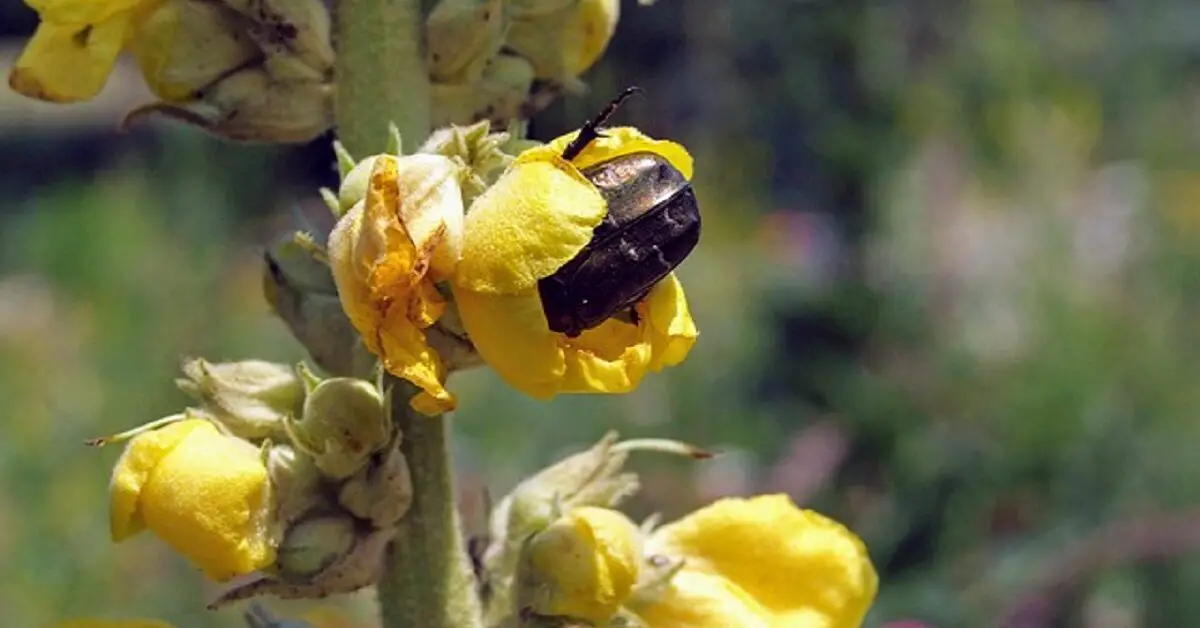
Recent medical research suggests that mullein leaf has many health benefits and may be used to treat several ailments.
This article lists 14 health benefits of mullein leaves, leaf tea, and extracts. We also explore the health benefits of the plant’s flowers, roots, stems, and their extracts based on evidence from recent scientific research.
1. Mullein contains antioxidants that may have anti-inflammatory properties
Mullein leaves contain a variety of antioxidants that may have anti-inflammatory, antihepatotoxic, and anti-hyperlipidemic properties.
The antioxidants in mullein include:
- Flavonoid antioxidants that have anti-inflammatory properties
- Triterpenoid saponins that have anti-inflammatory, anti-cancer, and pain-relieving activity
- Phenylethanoid glycosides have anti-inflammatory and antiviral properties
- Tannins have antioxidant properties
- Terpenoids are pharmacologically active substances with antioxidant properties
- Iridoid glycosides often play a role in plant defense against herbivores, insect pests, and pathogens; they also have antioxidant and anti-inflammatory properties
- Vitamin C
- Sesquiterpenes are anti-microbial agents that include artemisinins, dihydroartemisinin, artesunate, artemether, and arteether used for treating malaria
2. Mullein extract may have antiviral and antibacterial properties
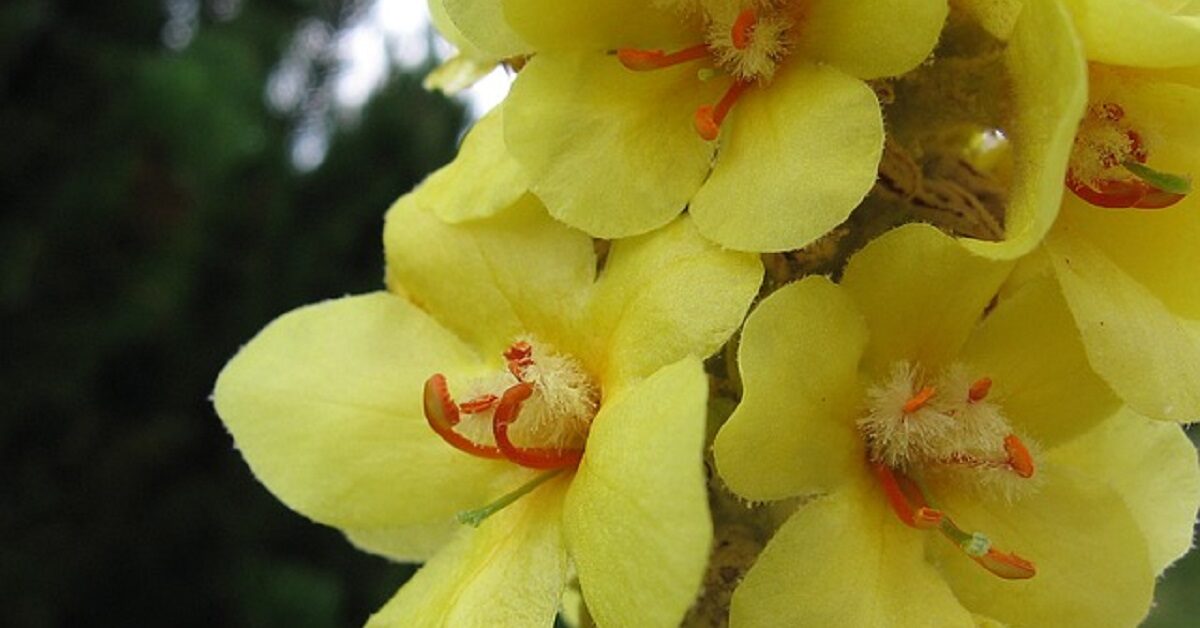
Many active components of mullein have antiviral and antibacterial properties. Mullein leaf tea and tincture may be used as a disinfectant and for the treatment of certain infections, multiple studies reported.
Diker et al. reported that a sterile solution of saponin glycosides, ilwensisaponin A and C, isolated from the methanolic extract of the flowers of mullein plant Verbascum pterocalycinum, showed antiviral, antinociceptive (ability to dampen the reaction of sensory neurons to painful or injurious stimuli) and anti-inflammatory activities. The solutions showed cytotoxic activity against Bovine Herpes Virus Type-1.
Extracts of mullein prepared in water, ethanol, and methanol, showed antibacterial activity against various bacteria, including Klebsiella pneumonia, Staphylococcus aureus, Staphylococcus epidermidis, and Escherichia coli (Turker and Camper).
Methanolic extract of Verbascum thapsus showed antiviral activity against the pseudorabies virus strain RC/79 (PrV) and cytotoxic activity against Vero cells (Escobar et al.).
3. Mullein leaf extract may be anticarcinogenic
Mullein leaf extracts may have anti-cancer properties (Mahdavi et al.). The researchers reported identifying several substances with potential anticarcinogenic activity in the ethanolic extract of the leaves. The substances included 1-hexanol (2.11%) and 2-hexene (1.95%).
The ethanolic leaf extract showed considerable antioxidant activity measured by its ability to scavenge DPPH free radicals at different concentrations. The inhibitory activity increased with the concentration of the extract. The authors concluded that V. Thapsus L. has potential use in the prevention and treatment of cancer.
We previously reported that the medicinal herb ashwagandha also has anti-cancer properties and that it may prevent cancers affecting women.
4. Mullein alleviates respiratory symptoms, has expectorant activity
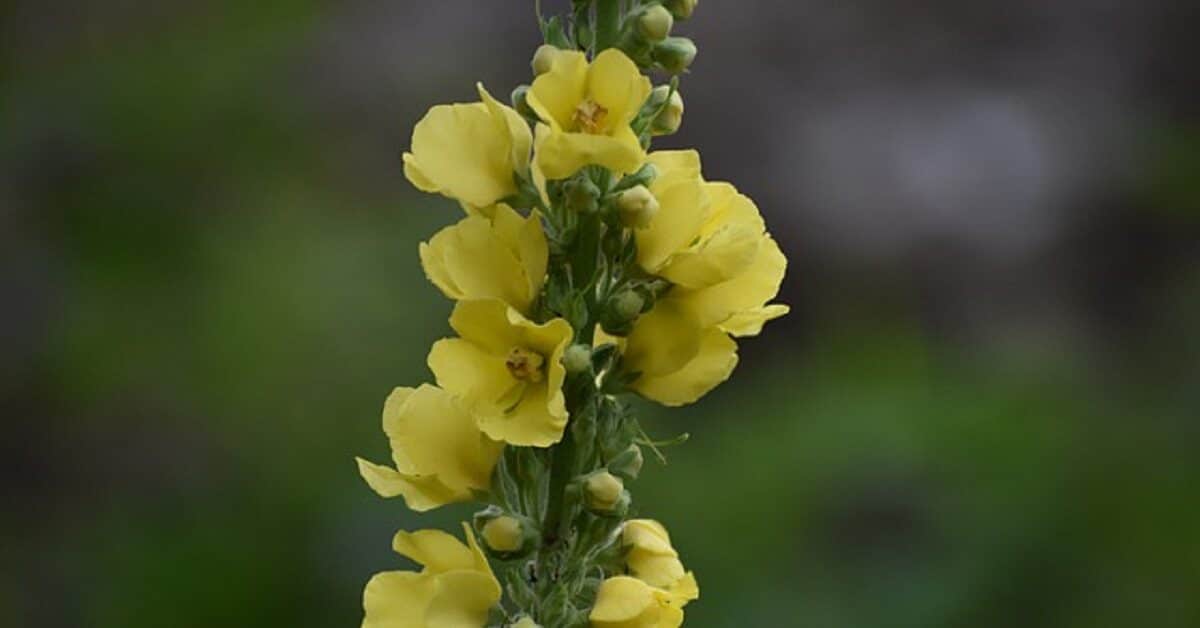
Extracts of mullein leaf and flower are used in folk medicine to treat respiratory conditions, including difficulty breathing due to catarrhs, asthma, bronchitis, and COPD. Herbalists also use mullein to treat bronchitis, dry coughs, whooping cough, tuberculosis, pneumonia, asthma, and hoarseness (Turker and Ekrem).
Not enough research has been done to evaluate the effectiveness of mullein extracts for treating or curing respiratory infections and diseases. However, Turker and Gurel reported that mullein extracts have expectorant properties and may be effective for relieving symptoms due to inflammation of the upper respiratory tract, including the nose and throat.
The expectorant activity of mullein may be due to saponins that stimulate fluid production. The polysaccharide mucilage content may also have a soothing effect on the airway, making mullein useful for treating coughs and the symptoms of bronchitis, asthma, and whooping cough.
When smoked in a tobacco pipe, the dried leaves help to relieve nasal or sinus congestion and asthma symptoms, according to Tucker and Gurel.
Although research studies suggest that mullein may alleviate the symptoms of respiratory conditions, there is currently no evidence that the extracts can cure lung infections and diseases, such as tuberculosis and pneumonia.
However, some studies reported that plants, such as mullein, that contain anti-inflammatory “saponin-type” compounds, may protect against or prevent upper respiratory tract infections caused by bacteria (Cankaya and Somuncuoglu).
.
Blanco-Salas et al. suggested that the effectiveness of mullein extract solution in relieving symptoms caused by upper respiratory tract conditions may be due to the anti-inflammatory properties of the plant’s phytochemical constituents.
5. Mullein may have anthelmintic or wormicidal activity
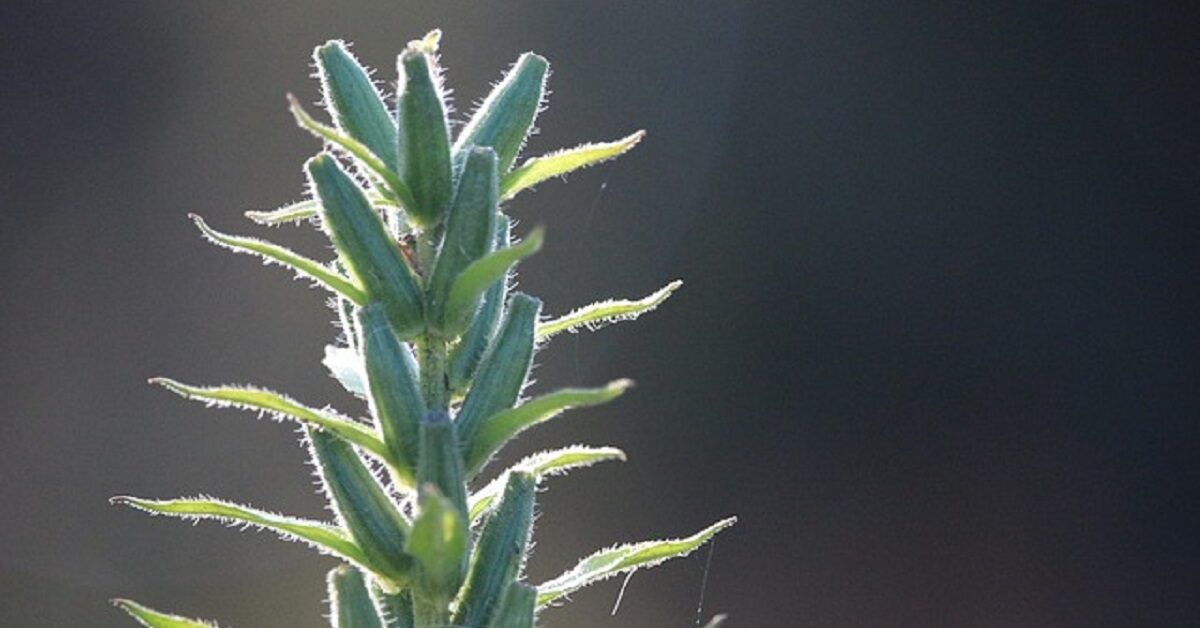
Ali et al. reported that an aqueous methanolic extract of mullein (Verbascum thapsus) showed anthelmintic and antispasmodic activity against roundworms (Ascaridia galli) and tapeworms (Raillietina spiralis).
At high concentrations, extract of mullein induced paralysis and death in roundworms and tapeworms. According to the authors, mullein extract may be a more potent wormicidal agent than albendazole against tapeworm.
6. May relieve earache in acute otitis media
Some studies report that mullein extract may be effective for the relief of ear pain or ache due to infection.
Mullein extract used with other herb extracts helped to reduce ear pain and ache associated with acute otitis media (inflammation or infection of the middle ear) in infants and children (Sarrell et al., Blanco-Salas et al.).
The researchers concluded that mullein extract solution may be beneficial for relieving ear pain.
According to Blanco-Salas et al., the effectiveness of mullein extract solution in relieving ear pain may be due to the anti-inflammatory action of its constituent phytochemicals, including quercetin.
7. May help treat skin and soft tissue infections

A study proposed that mullein extracts may be effective for treating skin and soft tissue infections (SSTIs), such as impetigo, folliculitis, furuncles, carbuncles, erysipelas, and cellulitis.
Shade et al. tested the extracts of several medicinal plants with claimed antibacterial properties — including mullein (Verbascum thapsus), red clover (Trifolium pratense), lesser burdock (Arctium minus), bilberry (Vaccinium myrtillus), and yarrow (Achillea millefolium) — for their antibacterial activity against SSTI-causing bacteria and MRSA.
They tested the extracts against bacteria such as Escherichia coli, Staphylococcus aureus, Pseudomonas aeruginosa, and Streptococcus pneumoniae. They found that mullein and red clover extracts had the highest inhibitory activity against bacteria, including MRSA.
The result suggested that mullein extract may be used as a topical application for skin and soft tissue infections.
Mullein extracts may also have emollient (soothe and soften irritated skin) properties due to the antinociceptive and anti-inflammatory properties of their phytochemical constituents.
8. May play a role in urinary tract infections
Extracts of common mullein in 95% ethanol showed antimicrobial activity against Escherichia coli, Enterococcus faecalis, and Candida albicans (Dulgar et al.). The three pathogens cause complicated urinary tract infections.
The researchers concluded that Verbascum thapsus L. may be effective for urinary infections. They suggested that further studies were needed to identify and isolate active compounds involved in the antimicrobial activity of the extracts.
9. Virucidal activity against herpes simplex, influenza viruses

Lyophilized (freeze-dried) infusion from the flowers of mullein plant, Verbascum thapsiforme Schrad., showed virucidal activity against fowl plague virus, multiple influenza A strains, influenza B strain, and Herpes simplex virus (Zgórniak-Nowosielska et al.).
The result of the study is significant because Herpes simplex viruses (HSV-1 and HSV-2) cause lifelong infections often characterized by episodes of oral or genital lesions.
Serkedjieva reported that mullein showed enhanced activity against influenza virus A when used in combination with amantadine derivatives, including adamantanamine glucuronide.
10. Mullein has diuretic properties
Mullein extract has diuretic activity and may be used in the management of kidney problems, studies suggest.
Orally administered ethanol extracts prepared from the leaves, flowers, and stems of Verbascum nigrum L. showed diuretic activity in rats (Kalinina et al.).
The animal subjects showed a significant increase in urine output after administration of the extracts, especially the stem extract.
The authors reported a correlation between the diuretic activity of the extract and the concentration of flavonoids.
They concluded that their study confirmed the diuretic activity of V. nigrum. They also reported that the diuretic effect was due to the flavonoid content of the extract and that the concentration of flavonoids was highest in the stem of the plant.
11. Mullein has demulcent properties, alleviates symptoms of digestive disturbance
Mullein is a demulcent herb that may relieve the symptoms of upset stomach — abdominal pains and diarrhea — studies suggest.
Mullein’s demulcent activity is due to its mucilage content. The mucilage forms a thin layer that protects the mucous membranes and helps relieve irritation caused by ingested substances. It may also relieve digestive tract dysfunction following irritation by ingested food and other substances.
The mucilage may also protect the sensitive tissues lining the mouth, throat, esophagus, and stomach.
The soothing effect of mullein mucilage may enhance the plant’s antinociceptive and anti-inflammatory properties.
12. Bursitis, joint pains, and rheumatism
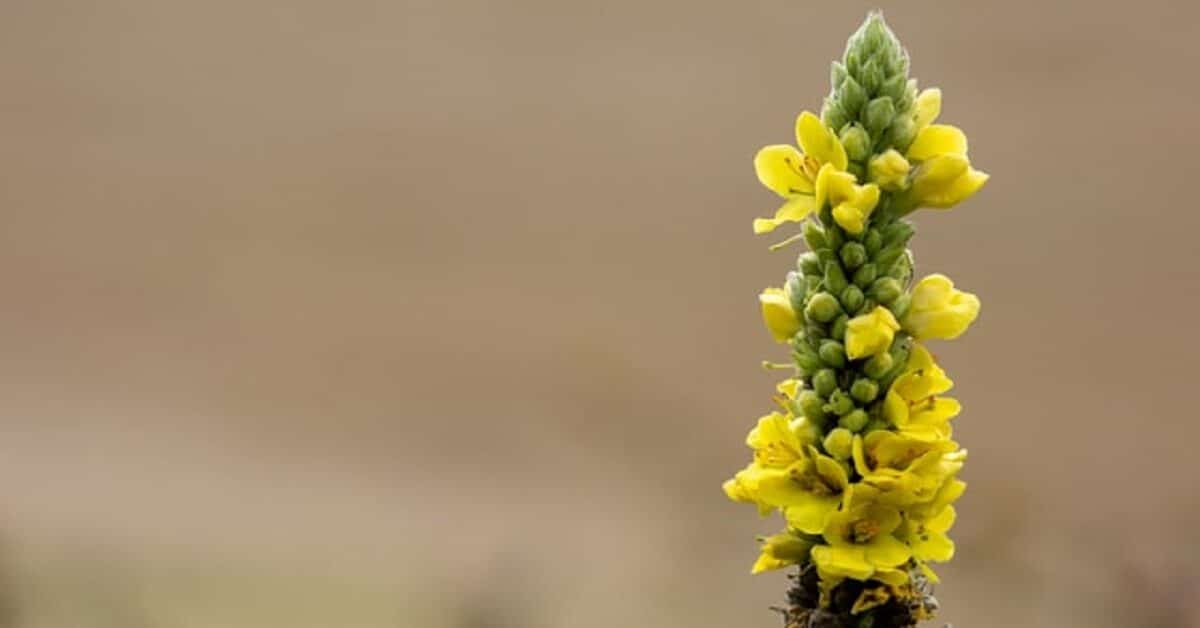
Bursitis refers to painful inflammation of the fluid-filled sacs (bursae) that cushion bones, muscles, and tendons at the joints.
Mullein leaf tea and extract may relieve bursitis and joint pains due to the activity of its anti-inflammatory antioxidant constituents, such as flavonoids and saponins.
It may also be used to treat rheumatism due to its anti-inflammatory properties.
13. Mullein leaf and hyperthyroidism
The claim by some sources that mullein leaf tea may be used to treat hyperthyroidism has no scientific research backing. However, mullein extract is rich in saponins that have powerful antioxidant and anti-inflammatory properties.
It has, therefore, been suggested that mullein could play a role in relieving inflammation of glands, such as adrenal glands and thyroid gland.
14. Role in hair care
Women in ancient Rome reportedly used mullein flowers to dye their hair yellow or golden. Mullein can also be used as a soothing emollient to treat dry hair and scalp conditions.
Mullein side-effects and toxicity
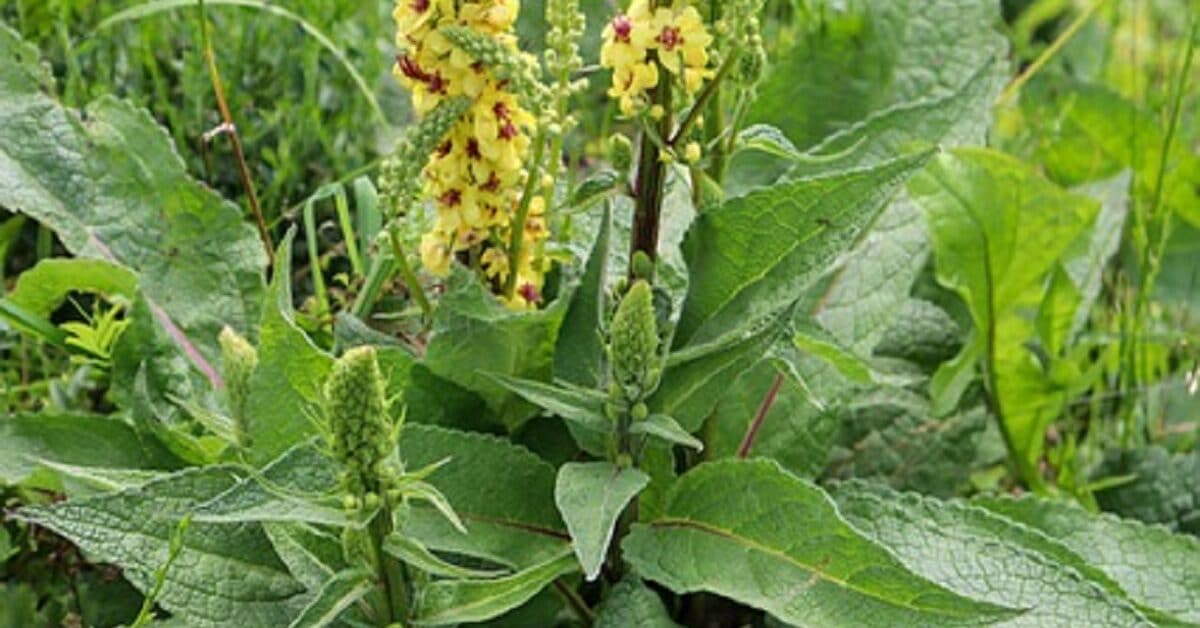
Mullein is generally well-tolerated and considered safe.
But Rodriguez-Fragoso et al. warned that despite the public belief that herbal products are safe because they are “natural,” many contain substances that may cause severe and even lethal effects.
Some herbs have naturally occurring toxic substances, while some preparations may have toxic contaminants. There are also known cases of interactions between herbs and drugs. You should, therefore, take care when using herbs, including mullein.
Mullein seeds contain rotenone and coumarin. Rotenone is used as a fish poison and insecticide. Long-term consumption of mullein products contaminated with the seeds may be harmful.
The signs of acute toxicity due to rotenone ingestion include depression and convulsions (Gupta). Other signs include nausea, vomiting, gastric pain, convulsions, tremors, incontinence, and respiratory issues.
Respiratory complications may lead to hypoxemia (low concentration of oxygen in the blood) and hypercapnia (excessive levels of carbon dioxide in the blood).
Rotenone may also impair myocardial contraction leading to cardiac problems. Inhalation of rotenone dust may lead to pulmonary irritation and asphyxia.
Mullein seeds also contain coumarin.
Although Lake concluded that exposure to coumarin from food and cosmetic products does not pose an immediate health risk to humans, exposure to high doses is potentially hepatotoxic.
A note to our readers
The information contained in this article is meant only for informational purposes and not in place of advice by a trained and competent medical professional or healthcare provider.
We advise our readers to talk to a qualified and experienced healthcare provider before using mullein products and other herbal preparations for supplementation or treatment of any medical condition or ailment.
Many of the conditions listed in this article, including herpes simplex and influenza viral infection, respiratory infections, bacterial urinary infections, skin and soft tissue infections, cancer, helminthic infestation, otitis media, digestive disturbances, joint pains, and rheumatism, are serious medical conditions. We, therefore, do not advise you to self-diagnose and self-medicate with mullein herbal extracts because only a doctor can correctly diagnose your illness and prescribe appropriate treatment.

